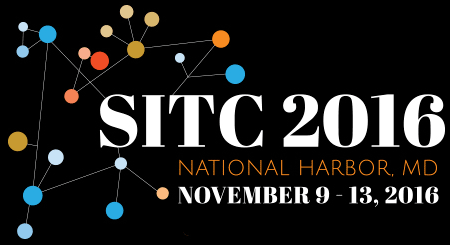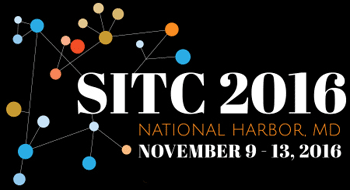New Cancer Immunotherapy Agents in Development
SITC 2016 opened with a dynamic program featuring presentations on clinical and pre-clinical immunotherapeutic approaches in development. Aimed at basic, translational, and clinical researchers, the New Cancer Immunotherapy Agents in Development session began with brief, rapid-fire presentations on cutting-edge immune-based agents and combinations. Following a discussion on different approaches to combination immunotherapy, an expert panel of leaders from industry, government, and academia participated in an extended discussion focused on the implications of having hundreds of combination immunotherapy clinical trials currently underway.
Program co-chair, Daniel S. Chen, MD, PhD (Genentech) noted that the field of cancer immunotherapy is increasingly focused on combination strategies as a means to deliver improved benefit with immune-based agents. Indeed, combination approaches, especially those including blockade of the PD-1/PD-L1 immune checkpoint pathway, dominated both the clinical and pre-clinical sessions. Many of the combination strategies presented aimed to augment the anti-tumor immune response either by stimulating the patient’s own immune response or by blocking inhibitory signals that limit immune system activity. Other agents targeted the other side of the equation – the tumor microenvironment – rather than the patient’s immune system. In combination with immune checkpoint inhibitors, these agents combat evasion strategies used by the tumor to exclude immune cell involvement. Highlights of selected data and creative strategies discussed during this program are summarized below.
Anti-semaphorin4D VX15/2503 in combination with ipilimumab or antibody to PD-1 or PD-L1
Elizabeth Evans, PhD (Vaccinex, Inc.) presented data supporting the combination of anti-semaphorin4D (SEMA4D) with ipilimumab or anti-PD-1/PD-L1 agents. A guidance molecule capable of regulating the migration and differentiation of cells expressing its receptor, SEMA4D is expressed on tumor cells and immune cells at the invasive margin, where it inhibits the migration of myeloid cells and prevents immune cells from infiltrating the tumor. Blocking antibodies specific for SEMA4D restored the ability of CD4+ T cells, CD8+ T cells, and dendritic cells to migrate into the tumor, while reducing numbers of immunosuppressive cells such as regulatory T cells (Treg) and myeloid-derived suppressor cells (MDSC) within the tumor microenvironment (TME). Anti-SEMA4D monotherapy did not provide sufficient tumor growth control in preclinical studies due to the presence of suppressive signals including immune checkpoints within the TME, but it has been shown to significantly enhance the activity of anti-CTLA-4 and anti-PD-1 therapies. The humanized IgG4 anti-SEMA4D was well-tolerated in phase I trials (NCT01313065) and phase Ib/II studies of anti-SEMA4D in combination with anti-PD-1/PD-L1 or anti-CTLA-4 for the treatment of non-small cell lung cancer (NSCLC), melanoma, and head and neck squamous cell carcinoma (HNSCC) are planned.
Activated natural killer cell (aNK) NK-92 cell line
A monotherapy approach utilizing modified NK cells was discussed by Patrick Soon-Shiong, MD, FRCS, FACS (NantKwest). The NK-92 cell line, so-called “off the shelf NK”, is engineered to undertake multiple modes of killing, without any inhibitory receptors, and comes in two varieties. High-affinity killing (haNK) cells bind to antibodies and mediate cell death through antibody-dependent cellular cytotoxicity (ADCC), whereas targeted killing (taNK) cells are designed to bind target antigens for direct killing via release of perforin and granzymes. Single agent activated NK (aNK) cells are being investigated in a variety of malignant disease settings, including a phase II clinical trial of patients with advanced Merkel cell carcinoma in which one of the patients experienced a significant partial response with >70% regression (NCT02465957). Dr. Soon-Shiong also provided examples of the synergistic effects of combining aNK cells with antibody-based therapies such as Herceptin (anti-HER2) for breast cancer, which would help the aNK target tumor cells directly. The tractability of aNK was further demonstrated by aNK expressing a chimeric antigen receptor (CAR) specific for HER2, which exerted an abscopal effect upon tumor re-challenge in pre-clinical models of brain metastases.
Leading into the extended panel discussion, Charles G. Drake, MD, PhD (Columbia University Herbert Irving Comprehensive Cancer Center) spoke about different immunotherapy combination strategies, including dual immunotherapy approaches and combinations of immunotherapy with conventional therapies. In particular, he emphasized the importance of understanding the mechanistic basis for the clinical efficacy of particular combinations to help inform development of rational combinations in the future. From there, the multidisciplinary panel members and attendees were invited to consider the implications of the fact that more than 800 combination immunotherapy approaches are currently in clinical trials. Panel members expressed optimism about the influx of potential new treatment strategies and saw this as an opportunity to determine which strategies optimize the balance of efficacy and safety. The use of new technologies will help establish the mechanistic basis for efficacy, and guide rational combination approaches in the future. Optimization of the drug development process, and integration of biomarkers into clinical decision-making, were also identified as critical to ensuring that only the most promising trials are selected to move forward.





Important Dates
Regular Abstracts Published in JITC
November 8, 2016
Late-Breaking Abstracts Published in JITC
December 8, 2016
Thank You, Supporters!
Thank you, SITC 2016 supporters. Because of your generosity, SITC 2016 was a great success!
Interested in supporting other SITC programs? Confirm your support today!


Connect with SITC!